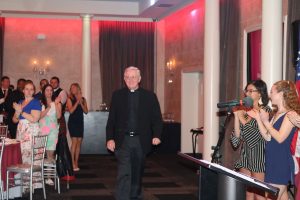Poland study abroad students attend special concert in preparation
March 11, 2015
There is no way to express in words how the Holocaust has affected those who suffered through it and witnessed the fascist takeover of Nazi Germany, but there is a way to express these emotions through art.
The people who were placed in the concentration camp Terezin stood up to their captors through music.
Prisoner and composer Rafael Schachter smuggled a copy of Giuseppe Verdi’s — a famous composer form the 1800’s – “Messa Do Requiem” to Terezin as one of his few possessions in the camp.
He found an old piano in a damp dreadful basement and decided he would start a movement of defiance against the Nazis with his interpretation of Verdi’s Requiem, the “Defiant Requiem.”
“I never realized how moving classical music could be,” said sophomore Patricia Keating.
By conjuring up a chorus of 150 prisoners, Schachter formed his own resistance against the Nazis by preforming the piece 16 times — “all practice for when we preform in Prague,” Schachter assured the chorus.
Schachter’s requiem was different from Verdi’s in that it held a secret message in the verses directed toward the Nazis that “nothing shall remain unavenged.” Each time the chorus executed these lyrics to the audience of prisoners, they were giving them hope and dignity; they were allowing them to feel human while the camp was dehumanizing them.
The chorus sang the final verse as “Liberate me” rather than “deliver me,” which the Germans were unaware of because the “Defiant Requiem” was sung in Latin.
Professor Elena Procario-Foley took her POL 422 religion class to the special performance at Lincoln Center, “Defiant Requiem: Verdi at Terezin.”
These students are preparing to travel to Poland over spring break to learn more about Christianity and Judaism during the Holocaust.
“It was empowering to know the meaning behind the lyrics and hear it out loud,” said Keating.
Going to see this expression of “Defiant Requiem” was an insightful way to help the students understand just how brutal but important this part of history was.
“We went to the ‘Defiant Requiem’ because it’s a unique way to understand the triumph of the spirit in a situation of extreme dehumanization,” Procario-Foley said.
Murry Sidlin, creator and conductor of ‘Defiant Requiem: Verdi at Terezin,’ put on a sensational indication of Schachter’s piece, and beautifully captured the terrors Terezin.
Sidlin founded The Defiant Requiem Foundation, which is a foundation that helps keep the art of Terezin alive by presenting “Defiant Requiem: Verdi at Terezin” all over the country. He successfully transformed the audience to Terezin in the 1940s by presenting clips of a documentary throughout the orchestra’s performance.
Survivors of Schachter’s chorus spoke in the film about their experiences at Terezin and how he put faith back into their hearts.
One survivor explained the music created at Terezin as “not asking where is God, but asking where is man.”
Having music in their hearts gave the prisoners something to look forward to, something to fight and to live for. The music helped them realize that the war wasn’t about an absence of God, but an absence of man.
Listening to the orchestra and chorus play this inspirational composition allows the listeners to create their own understanding of what is was like to be a prisoner inside a concentration camp and what it felt like to defy their enemy each time they sang.
“For me, to listen to the Requiem interspersed with the voices of Terezin survivors who sang in the chorus was both breathtaking and painfully beautiful,” Procario-Foley said.







